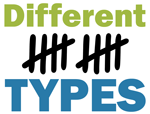Education serves as a primary foundation of gaining knowledge. It is important in that without it a person may act like a cave man with no idea on things and stuff surrounding him.
The twenty-first century has seen the level of education going up through educational research, and it has been racing side by side with technology advancement. Every day new things are discovered, and we have the right to know.
You may be wondering how a certain innovation came about, well, know that is all about education and with it researchers have been doing their best to make it more high level. That being said here are the different types of educational research.
Related: 9 Types of Colleges
Five Types of Educational Research
1. Correlational Research
A correlational study is a research method where a person may have two or more quantitative variables from similar groups of subjects while trying to ascertain whether there is a relationship between the two variables. Theoretically, he can correlate the two quantitative variables as long as he has scores from similar participants.
However, it probably would be a waste of time in collecting and analyzing data when there is less reason to think the two variables are related. The data can be gathered here through testing, i.e., a collection of scores in a knowledge test, e.g., an exam or math test.
Additionally, you can also undertake a psychological test or a survey and questionnaire among other data collection methods where you’ll get numerical responses. The collected data can be used as long as is in numerical form.
2. Experimental Educational Research
The major feature that differentiates this research from other types is that the researcher would be able to manipulate independent variables. In this research, there are numbers of design groups for experiments of which some of them qualify as research analysis while others don’t.
In real experimental research, the researcher would not only manipulate the independent variables but would also randomly assigned individuals to different treatment categories. In quasi-experimental research the researcher would not randomly allocate subjects to control groups and treatments, i.e., the treatment would not be distributed among the participants randomly.
In some cases, the researcher will randomly assign a whole group to treatment and another one to control. Thus this experimental research would involve the use of therapy groups in the experiment rather than random assigning of individuals to investigate conditions.
The causal-comparative study research is research with groups which have already been formed. This research does not meet the preliminary standards because there is no manipulation of independent variable therein.
3. Quantitative Research
Quantitative educational research is a research method that emphasizes statistical, measurement, and numerical analysis of collected data through surveys, polls, and questionnaires by manipulating pre-existing statistical information based on computational techniques.
The primary objective of conducting this research is for determining the relationship between one thing and another within a population. The study research design is either in narrative or experimental form.
A descriptive research study would establish an association between variables while the experimental one would establish causality. A qualitative research would deal in actual stance numbers and logic.
The research focuses on the numeric detailed unchanging data and convergent reasoning. Its main characteristic includes the gathering of data by use of structured research instrument.
The basing of this research study is with larger sample sizes that are representative of the population. This research study can easily be replicated due to its high reliability.
4. Qualitative Research
A qualitative educational research is an exploratory research study that is used in gaining an understanding of underlying reasons, motivations, and opinions. The study research offers insights into the problem or assists in developing ideas or hypothesis for future quantitative research.
This research study can also be used in uncovering trends in opinions and thoughts and digs deeper into the problem. Furthermore, the research method varies by use of unstructured and semi-structured techniques. Also, it is used in quantifying the problem by generating data which can be transformed into real statics.
The research uses measurable data in formulating facts and uncovering patterns in research. The data collection method of quantitative research is more structured than qualitative ones.
This research method includes different forms of surveys, e.g., online, mobile, paper and kiosk surveys. Others include face to face, telephone interviews, online polls, website interceptors, and longitudinal studies.
5. Mixed Educational Research
The mixed research method involves the mixing of qualitative and quantitative data, paradigms, process, and methodology in study analysis or set of studies related.
This research is a particular case of multimethod study. The research can be improved through the use of multiple methodologies, standpoints methods, data, and perspectives.
There are three classes of this research study they include the quantitative design approach, qualitative design approach, and interactive status layout.
The quantitative research study is a study at its core with both qualitative and quantitative method added to improve it by providing wider and fuller answers to questions asked, while qualitative study helps in improving the research study by providing larger and fuller answers to research questions.
The interactive study emphasizes both the qualitative and quantitative data method. One similarity between the three research studies taken separately is a researcher would need to maintain his focus on the initial purpose behind his methodological choice.
However, the significant distinction between the two is the way some writers would differentiate between them whereby they would propose that there is internal logic in one that is different from the other.
See Also: Different Types of Chemical Reactions
Conclusion
Research is an investable aspect of life to people. It is directly linked to growth, knowledge, and development and is conducted by intellectuals, i.e., scientists who are society’s creative group where they receive ideas from various life events now and then undertake their research.
The possibility for comprehensive research may raise some vital questions on the research output or process, i.e., what was the research all about? What was its absolute basis? Why was it initiated? How was it conducted? How was it evaluated? And how perfect was it?


Very informative